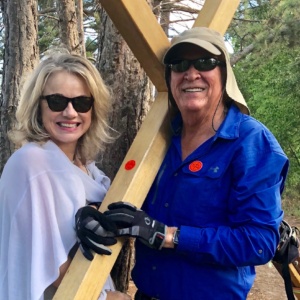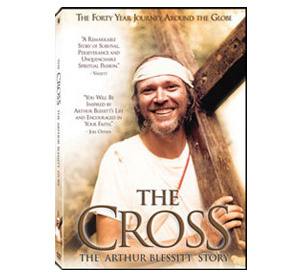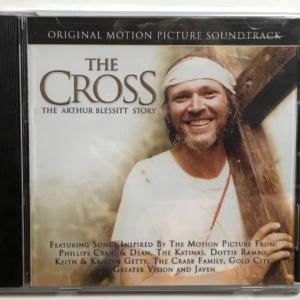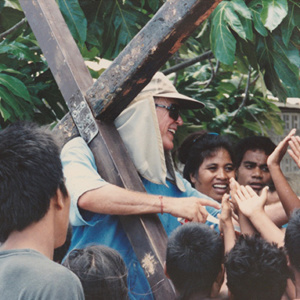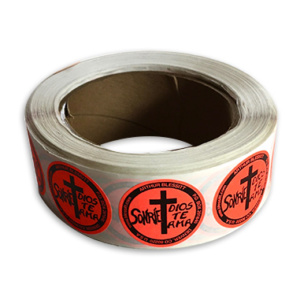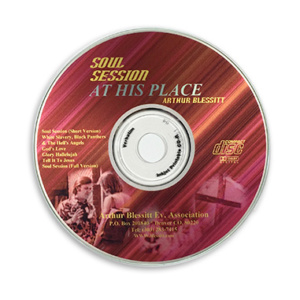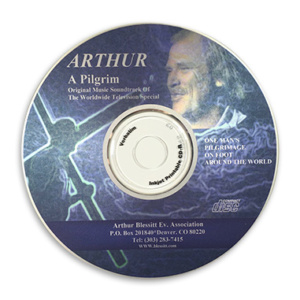THE TOWN TOO TOUGH TO CRACK
Owen Cooper was a legend in the South, one of a rare breed, a multimillionaire and a fervent, dedicated Christian. A leading industrialist, he was president of two large chemical companies and director of a bank and a score of corporations. He had twice served brilliantly and conscientiously as president of the Mississippi Baptist Convention and was vice-president of the Southern Baptist Convention and director of the Pioneer Missions Committee. In the press he was often described either as “Mr. Mississippi” or “Mr. Mississippi Baptist.”
Owen Cooper wasn’t a man to waste time with small talk: He had a reputation for going to the jugular vein of a conversation. I couldn’t imagine what door, if any, he was opening for an anonymous twenty-two-year-old college student doing his best to serve the Lord.
When I arrived at his office, his secretary said, “Mr. Cooper and a group of other men are waiting for you.” I glanced quickly at my watch, found I was on time, and sighed with relief. Punctuality has never been one of my attributes.
In person Mr. Cooper matched his reputation. Six feet tall and 185 pounds, he radiated quiet power and forcefulness. He welcomed me cordially and smiled warmly as he introduced me to the four other men ranged around the room: Claude Townsend, president of the Jackson piano company bearing his name; Chester Quarles, executive secretary of the Mississippi Baptist Convention; Joe Odle, editor of the Baptist Record, the largest newspaper, secular or religious, in Mississippi; and the Reverend William Parker, the area missionary in Montana for the Southern Baptist Convention.
These five men were waiting for me, the secretary had said.
But for what conceivable reason?
?The suspense ended abruptly.
“We’re looking for a college student to send to Anaconda, Montana, to start a new mission,” Mr. Cooper said. “Would you like to go?”
Anaconda, Montana? It was only a half-remembered name from a high school geography book.
“Why me?”
“We’ve heard about your work in Brookhaven.”
“I don’t know anything about starting a mission. Who would train me?”
“There will be no training,” Mr. Cooper said tersely. “You’ve already had it at East Lincoln.”
While I sat open-mouthed, the Reverend Mr. Parker, who knew Montana as well as he knew his Bible, explained that the Southern Baptist Convention had unsuccessfully tried for several years to carry its evangelical message into Anaconda. Two churches had been started and both failed, victims of indifference.
I wasn’t sure what to say or how to react. My life was committed to serving God, but the offer, so surprising and unlikely, filled me with a foretaste of failure. How could I succeed where others with far more experience had been compelled to give up? I would be an alien in a strange land. Someone in the room mentioned that Anaconda was 2,300 miles from Mississippi, and I had never been out of the South.
I asked for time to think it over.
As I prepared to leave, Mr. Cooper said, “Before you decide, there’s one more thing you should know.”
“Yes, sir?”
Owen Cooper’s voice was razor sharp. “I’ve been told Anaconda is a town too tough to crack!”
I left with mixed emotions and tried to sort my thoughts out by discussing the offer with everyone close to me.
Dad and Mom said no. (“People outside the South are different. Most of them are good people, but different nevertheless.”)
My professors said no. (“Keep studying.” “Why lose a year of school?” “Education comes first.”)
Preachers I knew said no. (“Impossible!” “Anaconda, where’s that?” “You won’t convert enough people to fill a station wagon.”)
The more “no’s” I heard, the more I leaned toward going. I kept remembering Mr. Cooper’s final words. But did he whip out that sentence as a warning to be cautious or a challenge to be courageous?
Only my friend Bill Mosley offered encouragement. “If you feel the Lord leading you to Anaconda, then go.”
Two incidents clinched it for me. Walking by the post office in Jackson one day, I saw the famous World War I recruiting poster that had been revived Uncle Sam pointing a stern finger and saying, “I want you.” I gazed at the poster, transfixed. I found a card with a prayer that someone had written on it in my wallet. I had never before taken the time to read the words. “O God, glorify Thyself today at my expense. Send me the bill anything, Lord. I set no price. I will not dicker or bargain. Glorify Thyself. I’ll take the consequences.”
The signs were all pointing in one direction Anaconda.
When I told Dad that I had decided to go, he didn’t try to change my mind. Instead he gave me the advice that is still my standard, the simple, meaningful principles by which I live. No son ever received a more precious gift of wisdom:
“Always let God fill your heart with love.”
“Look at every person as though he were a member of your own family.”
“Think of every man as your father, except that he may be lost and needs Jesus.”
“Think of every woman as your mother, except that she could need Christ to change her life.
“Look at every boy and girl as your brother and sister and consider them all candidates for the Lord’s mercy and blessings.
“Never insult a man or a woman by look, word or gesture.”
“Love everybody. The good have already earned your love. The bad may give you love when you least expect it.”
“Don’t look up at anyone and don’t look down at anyone.”
“Consider every woman a lady, every man a gentleman.”
“If you do this, you’ll never mistreat anyone or pass them by without telling about God’s power to save.”
That is my code. To me any women has always been a lady, a stumbling, incoherent drunk a gentleman. No matter what the provocation I’ve never answered a curse with a curse. I’ve attempted to treat everyone with the love and respect I would want for my own family.
In practice, Dad’s advice has been priceless. It has soothed my anger, given me patience and understanding, forged friendships, and helped me win souls for Christ.
The semester is at an end, I left on June 10, 1962, at 11 P.M. on a boiling hot and humid Mississippi evening. The transition in climate a week later would be stark. I was to learn that it snowed in Montana in June.
My blue ’55 Ford limped along, radiator smoking, eating gas and oil copiously. The water pump broke in Raton, New Mexico. It cost twenty-two dollars to fix, which put a massive dent in my budget. I’d left Mississippi with one hundred dollars.
The snow fell as I rolled through Montana’s 10,000 and 12,000-foot peaks. I’d never driven on snow before, and the more the car slid and skidded around the scythe-shaped curves above the yawning valleys below, the more I gave thanks that I was saved.
After seven days Anaconda loomed ahead. It is not the most beautiful city on earth. The first sight to hit you is an enormous, depressing mountain of slag, the unprocessable residue of ore. The ore is extracted from the mines at Butte, twenty-five miles away, and shipped to Anaconda, which has the world’s largest smelter.
The city was tossed together in 1883 as a working duchy of the Anaconda cooper and zinc mines in Butte.
The mine owners imported both rugged men from the potato-famine counties of Ireland and persecuted peasants from the mountains of the Balkans in southeastern Europe to work in the shadow of the peaks ringing Anaconda.
The men brought their religions Roman Catholicism, Lutheranism, and Serbian Orthodoxy’”with them when they settled in the deep, fiercely cold Anaconda canyon.
Driving along Main Street I wondered if there was room in Anaconda for the sound of yet another drummer. “Too tough to crack?”
I’d find out soon enough.
I had three immediate needs: a place to stay, a church building, and a congregation.
I pulled up at the Marcus Daly Hotel, named for the principal founder of the Anaconda Company, and told the desk clerk, “I’m a preacher. I’m here to start a new church and I want the cheapest place to stay.” He rented me four walls for only one dollar a day.
The bed was comfortable and I fell asleep a few moments after entering the room. I woke at about 10 P.M., still tired and very, very lonely.
I began praying aloud for guidance. During the night God came and told me that I wasn’t alone, and that I need not fear. If I knocked on enough doors, witnessed to enough people, and preached the Word, many lives would be changed.
I prayed nonstop till morning when I was totally confident of victory.
When I went down for breakfast the desk clerk, a charming, blue-eyed lady, signaled to me. She moved in close and confided in a low, almost conspiratorial voice, “A very wicked woman in plain language, a prostitute who’s lived in the hotel a long time came down an hour ago with her bags packed and said, ‘I’m checking out.’ When I asked why, she told me, ‘I don’t know where I’m going, but I’ve got to get out of here. I must be rooming next to a preacher. When I came in last night I heard him praying. I pulled a chair close to the wall and listened to him all night, crying and praying for people like me. I can’t stand it.'”
I was sorry I never got a chance to witness to that lady, but at least she was under conviction.
A Baptist pastor in Butte had arranged for me to use the Seventh-Day Adventist Church building for one Sunday. I placed an ad in the paper, optimistically announcing the formation of the First Southern Baptist Church of Anaconda. I expected the ad to draw something of a crowd, believers, nonbelievers, and those who might be curious to meet Anaconda’s newest minister.
When the moment for the service came that Sunday I raced to the pulpit and preached and on-fire sermon titled, “The Challenge Before Us.” Never had I preached so fervently. I lost track of time and when I finally concluded I was out of breath and perspiring.
Then I issued the invitation to step forward and be saved and to join the First Southern Baptist Church of Anaconda. My eyes were riveted on a pleasant, dark-haired, neatly dressed middle-aged man in the front row.
He was the only one who had heard my sermon, the only Anacondan who responded to my ad.
And even he did not step forward.
His name was Roland Smathers and I did convert him a few days later. “Only reason I didn’t make the decision that first day was that sermon of yours scared me to death,” he told me. “Never heard a preacher carry on so.”
My first service had bred my first conversion. That’s how you start with one, then two, then more, and yet more. A journey of a thousand miles begins with a single step.
I began roaming the streets looking for a permanent meeting place. Across from the courthouse was a Salvation Army building. I tried the door but it was padlocked.
The rent was $30 a month, and when I entered the building the sight was beautiful. It was all there organ, piano, carpeted floor, recreation hall, classrooms, heater, and even a refrigerator.
I was elated. Finding the building was proof anew, if proof was needed, of the power of God.
But when I looked at those empty classrooms my heart ached. Then it occurred to me that since it was summer, why not start a Vacation Bible School for Anaconda’s children? “Those who seek me early shall find me,” Proverbs 8:17 counseled. And in Proverbs 22:6 was the clear mandate, “Train up a child in the way he should go and, when he is old, he will not depart from it.”
That night, while I was still considering the challenge of starting the school, I heard a knock at my door. A crinkly eyed, smiling old woman introduced herself, and told me she’d learned through the Pioneer Missions Board that I was in town.
“How can I help you?” Mom Anthony asked.
Well into her nineties, Mom Anthony was a cheerful, amazingly spry, and independent, an altogether remarkable senior citizen. She had the tireless energy of one fueled by a passionate love for the Lord. At an age when others thirty or more years her junior were huddled in retirement and convalescent homes, Mom indefatigably traveled the world, spreading a shower of good works wherever she went. For more than twenty years, she’d been a missionary and Christian troubleshooter.
“After my husband passed away,” she said, “I asked myself: What am I going to do with the rest of my life? Just sit around, waiting to die and go to Heaven?”
Mom decided she would earn her place in Heaven a hundred times over. I spent the night listening to her tell story after story as mesmerized as the Sultan of Persia hearing the tales spun by Scheherazade.
My favorite was her experience during World War II. Shortly after Pearl Harbor, she was courageous enough to open her house in Texas to a number of students of Japanese ancestry. These young Nisei had slipped through the cordon thrown up by panic-stricken Californian authorities who were herding all the yellow-skinned men, women and children they could find into primitive, barely habitable camps. Despite the loud disapproval of her neighbors and community pressure, Mom kept those young, blameless Japanese-Americans with her until the end of the fighting.
She was tough as well as good.
Mom said she’d help me recruit pupils for our Bible school. Together we piled into my car the next day and bumped our way over the dreadful unpaved streets outside town. “Worse roads than I saw while I was a missionary in Nigeria,” Mom declared disapprovingly.
We stopped at random at house after house and knocked on doors. On some of these forays we traveled two-hundred miles a day throughout the county to sign up the kids. One week my oil bill alone was nine dollars.
But the kids came, their high-pitched laughter filling the building. And through the summer, they learned the things of the Lord. For most of them, it was their first encounter with Christ.
Fifty-eight youngsters, all under fourteen years old, completed the course, and nineteen were saved.
Mom and I shared a wonderful victory through those children. There would have been even more youngsters in the class, except for parental opposition to an evangelical ministry.
One nine-year-old boy who dropped out in mid-summer told me, “My folks said I can’t come to your church again, and you can’t come to our house any more. I like you and when I get big, I want to come to your church.”
Even more poignant was a letter I received from one of my former pupils, a thirteen-year-old girl, “Dear Arthur,” she wrote on a lined piece of composition paper, “I don’t think you had better come to get me on Sunday because mother will not let me go. I’m very sorry. I love my mother very much and I don’t want to hurt her more than I already have by going to your church and believing in Christ. Since I was saved my life has been changed. I want to get baptized, but Mom won’t let me. I promise that when I get older I am going to be baptized. I know Christ understands, and I hope you do, too.
I thought of those misguided parents and the words of Jesus in Matthew 19:14, “Suffer little children, and forbid them not, to come unto me; for of such is the kingdom of heaven.”
Still the kingdom of Heaven had been breached in Anaconda, and our first impact had come through the children.
When Bible school ended, Mom took off for her next assignment for the Lord in a cloud of confident good humor.
How I hated to see her go, though I knew her call to leave was as loud as mine to stay.
By now I had seen enough of Anaconda to realize how many were bereft of the hope of God. It was a hard place to earn a living, a cruel, mountainous spot where, as I would discover during the approaching winter, temperatures went down to forty degrees below zero. I wondered what made so many of these aimless Anacondans fight so ferociously for survival. They were nowhere and going nowhere except to hell once the hell of their lives on this earth was ended.
I rededicated my heart to winning new souls for Christ.
On Main Street one morning as I was passing out tracts and looking for prospects, I saw a small down-at-the-heels building and walked in. It was a combination greasy spoon and pool hall. About a dozen teen-age boys were hanging around, some at the tables, a few at the two pinball machines.
“Have you got Christ in your hearts?” I asked in a loud voice.
Every head turned toward me.
Then they laughed and cursed. One of them snarled, “Take your Bible and take off. You’re not our kind. You don’t belong in a place like this.”
“Don’t any of you have guts enough to listen to me?”
Then I heard a strong voice behind me. “What’s going on?” A tall 195-pounder with big arms and red hair stepped over.
“Hey, Tiny, this guy’s some kind of religious nut,” one of the kids said.
“What do you want?” Tiny asked.
“I want to talk about Jesus and what Christ can mean in your lives.”
“You stand there like a man,” Tiny said. “I’m a man, and I’ll listen to you and all my boys will listen. You sit down and let’s hear what the man has to say.”
The command was obeyed immediately, and I now had, thanks to Tiny, their undivided attention.
“I want to show all of you how to be saved. We’re all sinners-me, too. I can read your faces and see in your eyes that not one of you is happy fooling around this place, wasting your time playing pool and pinball.”
“I’m happy,” roared one of the young lions, “happy as…!”
A look from Tiny that could almost kill turned the “happy” protester into a meek kitten.
“Let him finish,” Tiny said through clenched teeth.
“I say you’re not happy. The Bible says you’re not. Jesus knows you’re not. Because if you don’t have Jesus in your heart, you can’t be happy. He’s your only salvation.”
They stayed cowed and quiet until I was done. Then I felt Christ reaching down, beginning to touch them, particularly Tiny.
“Okay,” Tiny ordered, “you guys take off.”
They rose in phalanx and were out the door in seconds. Tiny moved me to a corner a corner and asked me to sit down.
“You for real?”
“Real as Jesus.”
“I’m interested in what you saying.”
Then Tiny unburdened himself. It was not a happy story.
He was only seventeen and the leader of a thirty member gang, the most notorious teenage gang in Anaconda. He lived with his mother and stepfather and had been in and out of trouble for four years. Somehow he had escaped reform school, though he had appeared in court on
charges of assault, robbery, drunkedness and dealing dope.
“They’ve got a file on me at Juvenile Hall high as the slag pile at the smelter,” Tiny said. “Funny though, I don’t need the money we steal. My mother will give me anything I want. I turned wild at thirteen, wouldn’t go to school, and began running the streets. That was about the time my mother remarried.” Tiny’s gang rendezvoused at bars that violated the law by serving drinks to minors (all the members of his gang were below the legal drinking age). After several rounds of hard booze at the accommodating bars, the gang’s idea of a big evening was to take off for the hills and have an all-night beer bust. Now Tiny made a strange request.
“I want to be sure you’re real. I want to see if you’re some rich preacher on his way to a fat belly who’s looking down your nose at me.”
I took Tiny to my hotel room. I was thankful that a dollar a day didn’t buy much ostentation. He was properly impressed at the modesty of my hole in the wall. Then we walked down the street to the church building. I didn’t have enough money to eat in restaurants, so I’d installed a hot plate to warm the staples on which I lived all the time I was in Anaconda-mainly powdered milk, canned biscuits, and pork and beans. I whipped up a dish of canned spaghetti, and Tiny and I continued to talk. Tiny was beginning to learn of the spiritual nourishment offered by Christ. In many ways Tiny was the stereotype juvenile delinquent. Everyone his parents, schoolteachers, the courts, police, his probation officer had given up on him. They felt it would be only a matter of time until Tiny was back in the hands of the authorities, eventually winding up in prison. He was smart enough to sense this, and I think it was the reason he confided in me. He was yet another searcher, and what I offered him-a new life through Jesus-had never been offered to him before.
Tiny did not make a quick, dramatic, emotional conversion. As he left, a thoughtful expression on his face, he said only, “I’d like to talk to you again.”
Perhaps there was hope for Tiny.
Meantime, I was still the only official member of the First Southern Baptist Church of Anaconda.. Roland Smathers, my lone parishioner, hadn’t been baptized. So the Lord and I had a business meeting and together we voted to have a week of revival. I put up a big sign outside the building and had some brochures printed. But I knew that wouldn’t be enough to draw a crowd.
And there was no point in announcing the revival in the newspaper: My ad for my first service had drawn only Roland Smathers. I decided once more to go out and knock on doors and share Christ with anyone who would listen. In the next few weeks I don’t think I missed one of the more than twelve thousand doors in Anaconda. It was a slow, grinding, discouraging task, but each time I received a promise from a householder that he would come to the revival, my spirit soared and was renewed. The number of people that turned out for the seven days of revival didn’t exactly strain the facilities of the building, but I was heartened by the several dozen who did come. And Owen Cooper came up from Mississippi for a visit. He was much too generous in his praise for what little had been accomplished. The church was yet an acorn, far from the strong, healthy oak I wanted it to be, but it warmed my soul to hear his words of encouragement. During the revival, fourteen were saved and joined the church. At last we were on our way.
Among those who were saved was a big, redheaded teenager.
Tiny quietly came forward during one of the invitations and pledged his heart to Christ. Scratch one juvenile delinquent from the police blotter, I thought. After giving his heart to the Lord, Tiny changed completely. Soon be was holding two part-time jobs, an early morning newspaper delivery route, and an afternoon job unloading trucks at a warehouse.
Tiny’s newfound enthusiasm for Christ led him to disband his gang. One Sunday, Tiny shepherded all thirty of his pals and their girl friends to church to bear my message. Out of that crew, fifteen elected to go the way of Christ rather than Capone. The building became the new meeting place of Tiny and his friends. We set up a Ping Pong table, and checkers and chess boards, and had hammer and tongs Bible study, where questions were flung at me by alert, thirsting, curious minds that challenged everything I knew about theology. The conversions of these delinquents all took. Several were baptized, and today they are among Anaconda’s best, most God-loving citizens. Tiny became almost a full-time worker and my indispensable aide. But he did backslide once, a mistake that nearly sent him to prison before he rededicated his heart and made his final and irrevocable bargain with Christ.
A hard-scrabble town, Anaconda was infamous throughout that area of the West as a pocket of sin where everything was for sale. It was a magnet for roughhouse ranchers, cowboys, lumbermen, and construction workers who came in on weekends and vacations from all over southern Montana, northern Idaho, and Wyoming to whoop it up in a frantic search for pleasure.
There were more than forty bars in the city (outnumbering the churches, naturally). Though gambling was against the law, many bars had small backroom casinos where stud, blackjack, and dominoes were played with money openly on the tables. But the most upsetting abuse of decency practiced by the bars was their readiness to serve drinks to kids as young as thirteen and fourteen.
The crime rate in the town was high, law enforcement a scandal; this was accepted by the “respectable” people of Anaconda as “the nature of things.”
The so-called respectable citizens, the churches, and the police were three pillars of indifference. A reform mayor, backed by an aroused citizenry, could have cleaned up the town simply by enforcing the laws already on the books. Tiny’s trouble occurred while I was in Denver for a week attending a Baptist convention. He went into a bar, had a couple of drinks, got into a fight, and was arrested.
When I returned to Anaconda, I found Tiny in a jail cell, deep in depression.
“Guess I’ve done it this time,” he said. “They’re going to put me away for sure, I know it.”
Repentant and remorseful, Tiny prayed with me, and he came to the Lord a second time. I was certain of his sincerity and since I had seen so much good in Tiny I determined it would ill-serve the taxpayers of Montana to imprison him. Tiny belonged to Christ. Not for a moment did I excuse his mistake. He admitted his guilt but I believed him when he said be wouldn’t slip again.
Given another chance, he could serve a long, useful, dedicated Christian life.
But there was another factor beyond Tiny’s guilt. Why wasn’t the bartender, who had knowingly served him illegal drinks, occupying the next cell? It was the height of hypocrisy for the law to be enforced against Tiny while the shoddy little profiteers who owned the bars got off scot-free.
I set myself the twin goals of preventing Tiny’s sentencing to reform school and waging war against the honky-tonks that ignored the statute forbidding them to sell drinks to those who were underage.
Seething with indignation, I barged into the office of the chief of police.
“I want something done about the bars that are selling liquor to minors.”
He feigned astonishment. “Now, that just isn’t happening.”
“I’ll take you downtown this moment and show you.”
“Sorry, I can’t spare the time.”
I drove to Helena, the state capital, and tried to see the Attorney General. He refused to meet with me. I talked with his aide who said, “Sorry, that’s a local problem. There’s nothing we can do.”
Next, I met with an official of the State Liquor Control Board, the agency that licensed the bars. An official told me vaguely, “When we get a chance we’ll send someone by to check those places out. Sorry we can’t do anything more right now.”
Everyone was “sorry.” It added up to a transparent runaround. The state was an obvious beehive of corruption. Each of the authorities to whom I brought my appeal had sworn an oath (on the Bible!) to uphold the law, yet they sanctioned the flouting of the law by Anaconda’s taverns.
Tiny’s mother was in court when I testified in his behalf. “This boy shouldn’t be sent to reform school,” I pleaded with the judge. “He made an error, but otherwise he’s been living right since be was saved. Check his record. You’ll see nothing good ever happened to him before he came to Christ. Putting him away won’t help him. I think you ought to crack down on the bars that serve Tiny and other kids. I’m begging for mercy for this young man, your Honor. If you show mercy, I’ll be responsible for him.”
The judge paroled Tiny into my custody.
Tiny never touched another drop and was never a problem again. He began to go with me on preaching missions and gave his testimony at revivals I helped organize in Great Falls, Missoula, and Three Forks. This once seemingly incorrigible boy headed for reform school helped inspire scores of people to embrace Christ.
Tiny subsequently joined the Army and went on to lead a zealous Christian life.
In my battle against the bars, meantime, I went, as a last resort, to the sheriff of Anaconda. I finally found a sympathetic ear. “Why are you so concerned?” he asked.
I told him about Tiny and all the other Tinys running loose in town.
“You mean business, don’t you?”
“Yes, sir.”
“I haven’t had any support in this city,” the sheriff said. “I’m as opposed to what those bars are doing as you are. If you’ll help, I’ll try to straighten it out. But you’ve got to go into one of these places and see a minor being served with your own eyes. Then call me don’t talk to any of my deputies.” The sheriff gave me his private number. It wasn’t an hour before I was calling him from a bar that was serving bourbon to a boy who couldn’t have been more than fifteen.
The sheriff arrived, took the bartender downtown and filed charges. However, the district attorney refused to prosecute on grounds that there was no evidence it had to be proven by chemical analysis that there actually was liquor in the glass.
But the sheriff was a courageous man. He called the juvenile authorities, and with his prestige they could do nothing but promise future cooperation. Thus the sheriff now had the ammunition be needed. He visited every joint in Anaconda and told the bartenders and owners that if a minor was served, be would close them down, chemical analysis or no chemical analysis.
That scared the bar owners. From that moment on, they stationed a man at the door to check the ID’s of all patrons. Minors no longer could be served in any bar in Anaconda.
But I wasn’t through with the bars yet. Next I pushed the sheriff to do something about the illegal gambling. I’d seen men lose a week’s pay, and wondered what their families would do for food until the next paycheck. The sheriff sighed and flashed a grin. “All right, but it’s the same situation. You’ll have to see money being exchanged with your own eyes and be prepared to testify in court.”
I reported dozens of violations in detail, branding the offending bars, describing the gambling, naming names of some particularly conspicuous losers, itemizing the amounts of money shuffled back and forth across the tables and into the slot machines.
The district attorney again refused to act. He said it would be impossible to build a case – there would be too many who would deny my charges. It would be the combined word of the bar barons against mine. Accustomed to the D.A.’s don’t-let’s-rock-the-boat attitude, the sheriff took matters into his own hands and began a series of no-warning raids. He confiscated poker tables and slot machines, and stored them downtown as evidence. The owners were told they were “under suspicion.” Though not a single case reached court, the sheriff’s tactics dried up the public gambling.
Serving drinks to minors and gambling, unfortunately, were not completely wiped out. A teenager could still get a sub rosa shot and the gambling went underground, but at least the abuses were controlled, and undoubtedly many gamblers and underage drinkers found it not worth the effort to indulge their vices.
Incidentally, none of the newspapers throughout southern Montana printed a word about the efforts that were being made to clean up Anaconda. Freedom of the press evidently also meant the freedom to suppress news. One muckraking journalist, backed by an honest, crusading editor, could have started a fusillade that would have compelled the district attorney to really put Anaconda’s house in order. But here, too, it seemed that apathy was king.
I continued to street witness and bring sinners to Jesus. One night I was witnessing outside the bars, trying to reach the drink sodden patrons as they emerged. From the corner of my eye, I noticed a tall, heavy-set man, about thirty years old, watching me.
One of the barflies was on her knees with me, accepting Christ. When the prayer ended and the girl promised to meet me the next day at church, the on-looker approached. “Can I buy you a cup of coffee?”
Astonishingly, he was an Episcopal priest. As we talked he told that a crisis of faith had enveloped him he was no longer certain of his belief in God or the efficaciousness of the church, though he was ordained and had been a minister for several years.
We talked for hours about the nature of Grace and the saving power of God, and in describing my own travails in building a church in Anaconda I emphasized how important faith was.
He said he’d like to hear me preach, and so he began coming to our Sunday services, always standing to the rear, not joining the congregation. Perhaps he was afraid of being seen in a church pastored by someone considered an apostate among most of Anaconda’s citizens. He always left at the moment I gave the invitation.
One evening he came to my room and said he still didn’t have the assurance of Christ in his heart. He asked me to pray with him.
The prayer we said together changed his life and gave him holy boldness. Now he was truly saved.
Several weeks later he told me, “I’ve transformed the whole focus and program of our church. I’m preaching like you, we’re singing hymns, quoting Scripture, and I’m asking people to step forward and dedicate their lives to Christ so that they can be saved.”
He was, we both realized, departing in some measure from the tenets of Episcopal doctrine. “But,” he said, “this is the way religion was meant to be.”
Soon word of a stray lamb reached his superiors. A contingent of church investigators was sent to examine his ministerial conduct. Evidently, he didn’t come off well.
He was transferred to Chicago where his “case” was under review. I tried to phone him several times, but no one would tell me where he was. I often wonder how he has fared. He was a good man of God and I trust time has dealt kindly with him, allowing him the opportunity of leading the lost to Christ.
The First Southern Baptist Church of Anaconda was now a congregation of more than fifty. We were formally constituted a church instead of a mission on September 26, 1962. Since I was now “legitimate,” ministers from several of Anaconda’s other churches began to visit me for the first time. They welcomed me into the official fraternity of the city’s church community.
By early December, six eventful months had passed. The church was established, rock-solid, and I had led hundreds to the Lord through personal witnessing. It was time for me to return to school in Mississippi.
My replacement was Pastor Tommy Huskins, who carried on brilliantly. The church now has its own building, a new House of God, its cross emblazoned against the harsh Montana sky, a symbol of compassion, love, and honor to Christ.
Anaconda was a turning point in my life. “For verily I say unto you, If ye have faith as a grain of mustard seed, ye shall say unto this mountain, Move from here to yonder place; and it shall move; and nothing shall be impossible unto you.” So said Jesus in Matthew 17:20, and so had it come to pass among the buttes and peaks of the Montana wilderness.
During many a long, sleepless night my faith and commitment to the ministry had reached their nadir in the face of so many disappointments, as ad the faith and commitment of my Episcopal friend. But always the truth came back to me I was being tested. Anaconda had been my proving ground. Come what may, I was going to stick with the ministry all my life.
That and salvation through Christ became the two guiding certainties of the passing moment of my existence on this earth.
The snows of Montana fell in thick, twisting flakes the night I was preparing to leave Anaconda. I had preached my last sermon and had shared several wonderful hours of fellowship with my congregation at a small going-away party they gave me.
The temperature lurked at zero as I stepped into my car, which was still in abysmal shape – no heater, holes in the floor board, no muffler or tailpipe.
I fought the snow and ice, letting the car coast down the mountains and praying it up the steep inclines, without seeing a sign of civilization until I reached Billings. I drove straight through to Mississippi, eating once a day and sleeping at the side of the road. I arrived home in time to spend Christmas with the family.
“I don’t know if you told us everything in your letters, Son,” said Dad, soon after I walked in to the house. “How was Anaconda, really?”
“Cold to the skin, warm to the spirit.”
“Was it as tough as Mr. Cooper said it would be?”
“It was tough, but not too tough to crack.”


